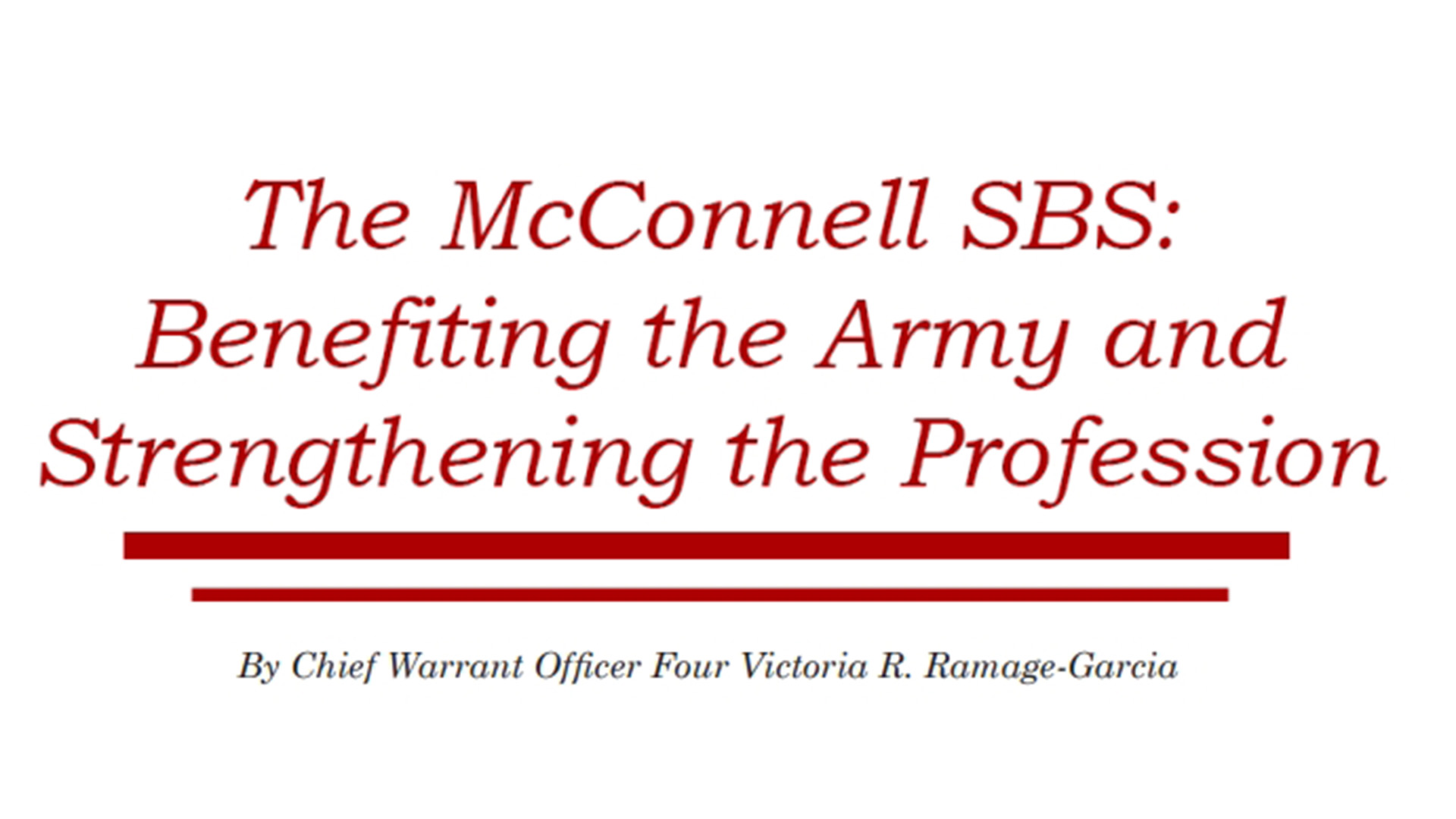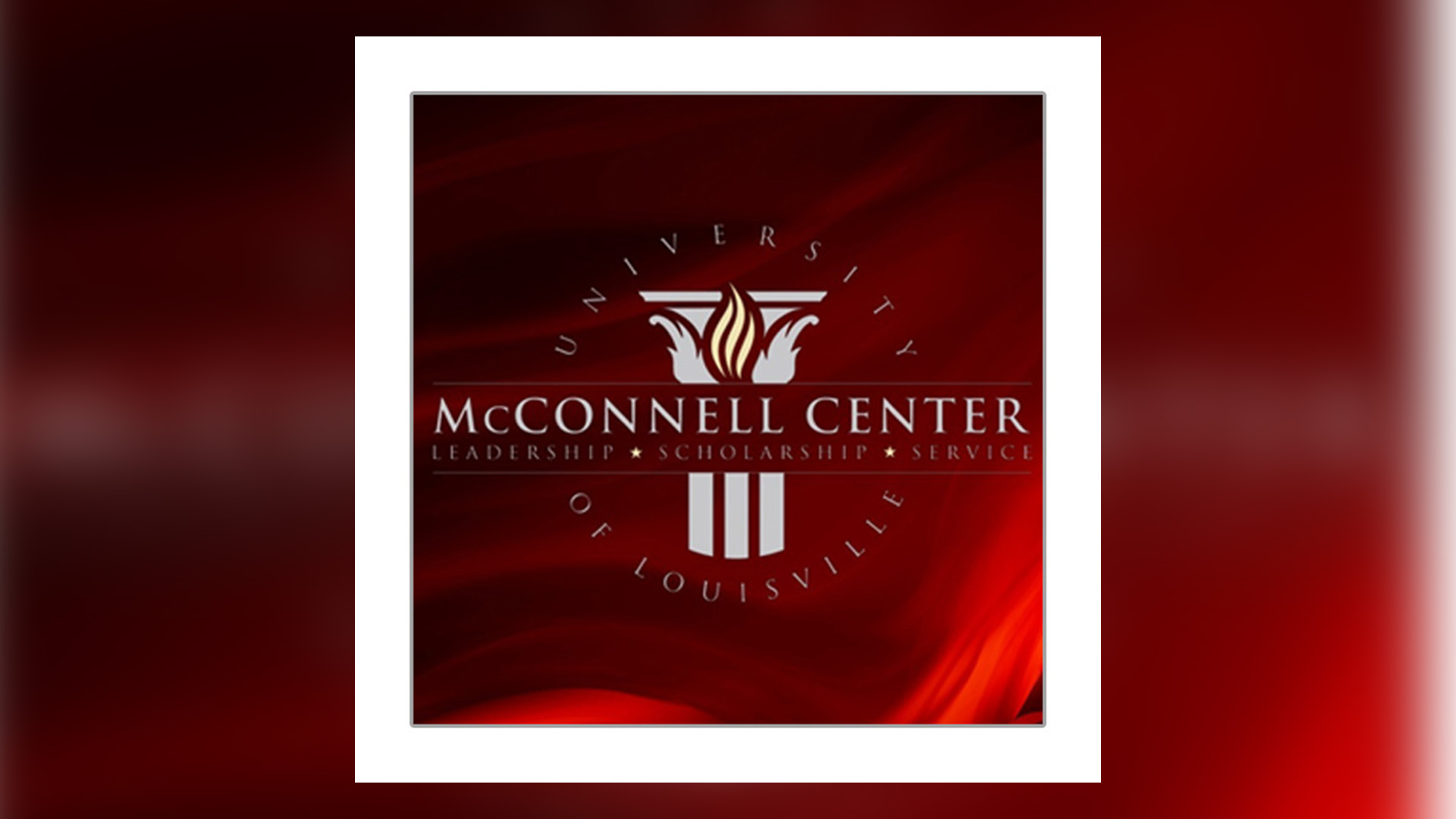The McConnell SBS
Benefiting the army and strengthening the profession
By Chief Warrant Officer Four Victoria R. Ramage-Garcia
Article published on: January 1st, 2024 in the Army Chemical Review 2024 Annual Issue
Read Time: < 5 mins

In 2014, General Raymond T. Odierno recognized a need for enhanced critical and strategic thinking and founded the McConnell Center, University of Louisville, Kentucky, Strategic Broadening Seminar (SBS). This program proactively develops specific aspects that holistically enable distributed leadership execution. U.S. Army leaders at all echelons should recognize that the SBS is an invaluable venue that broadens the critical and strategic thinking of high performers to help enable them to fight and win future wars. Contemporary foreign conflicts suggest that future large-scale combat operations and multidomain operations will prioritize dispersion to minimize battlefield visibility.1 This trend toward dispersed operations necessitates a renewed emphasis on developing leadership and critical thinking skills, augmenting agile and adaptive leaders and advisors capable of effective distributed leadership.2 Senior leaders can actively shape the profession and reinforce the stewardship priorities of the Chief of Staff of the Army (CSA) General Randy A. George by sponsoring high-performing subordinates for attendance at the McConnell Center SBS.3
The McConnell Center SBS emphasizes developing discourse skills, a concept often unfamiliar to those in lower echelons of the military, where future leaders and advisors are cultivated. As Brigadier General Kareem P. “Monty” Montague recently articulated in his article, “The Army’s Discourse Problem,” the lack of constructive dialogue negatively impacts leadership.4 The SBS directly addresses this problem by fostering an environment where sensitive topics (cultural differences, religion, ethics, and the “greater good”) are openly explored. This deliberate exposure dismantles hierarchical barriers, encourages diverse perspectives, and builds confidence in the participant’s ability to engage in professional discourse. Given that discourse directly impacts the cognitive domain of communication, these developed skills are essential for planning future large-scale combat operations and multidomain operations.
The McConnell Center SBS immerses participants in critical, philosophical discussions on 21st-century leadership.5 This exposure is crucial for warrant officers, who often have fewer opportunities for similar development compared to their officer-grade and enlisted counterparts. Through readings spanning Plato, Machiavelli, and modern works such as Achilles in Vietnam, participants explore the enduring relevance of ethics, values, and character during conflict. For example, Achilles in Vietnam highlights the potential for moral and ethical breakdowns in modern warfare and their profound impact on individuals and nations.6 This exploration of philosophical underpinnings cultivates a deeper understanding of leadership and empowers participants to guide subordinates and advise senior leaders with greater insight and ethical awareness. Consequently, senior leaders should reinforce the stewardship priorities of the CSA by ensuring that these critical developmental opportunities reach those who will shape the Army.
The McConnell Center SBS features expert lectures on China and Russia that are delivered by PhD-holding individuals who have a deep, personal knowledge of those nations. These lectures are regularly updated to reflect current geopolitical realities and offer political and military perspectives. The intimate connections between the presenters and their subject matter sets these presentations apart from standard theater briefings. For instance, Dr. Eugene Rumer, born in the Soviet Union and now director of the Russia and Eurasia Program at the Carnegie Endowment for International Peace, provides invaluable insights into the importance of understanding the history and culture of an adversary. Rumer conveys his message with a genuine passion that transcends typical intelligence briefings.7 Similarly, Dr. Shiping Hua’s lectures on China (inspired by his experience as an academic who disagreed with the People’s Republic of China ideology) offers unique and critical perspectives.8 Exposure to subject matter experts significantly strengthens the CBRN profession by providing participants a nuanced, firsthand understanding of critical geopolitical adversaries.
The final crucial element of the McConnell Center SBS is the direct engagement with McConnell Scholars and U.S. and foreign government leaders. The interactions with McConnell Scholars, many of whom are poised to influence future policy and legislation (including McConnell Scholar alumni Kentucky Secretary of State Michael G. Adams, U.S. Senate candidate Daniel Cameron, and CNN political commentator Scott Jennings) provide invaluable insights into the political landscape.9, 10 Furthermore, the program facilitates meetings with U.S. senators on Capitol Hill, Washington, D.C. The discussions that stem from these meetings address critical issues such as nuclear deterrence and the geopolitical implications of the Nuclear Non-Proliferation Treaty compliance, providing a firsthand understanding of evolving perspectives of senior leaders. Similarly, direct interaction with foreign diplomats such as Ambassador Kevin Rudd of Australia offers unique opportunities to discuss pressing geopolitical challenges; for example, China’s regional influence and Australia’s strategic procurement of nuclear-powered submarines.11 These personal engagements foster direct dialogue with influential figures and significantly strengthen the profession by providing participants a deeper understanding of policy and strategic decision making. Therefore, these opportunities should be actively supported by senior leaders, who should ensure that high-performing subordinates and future advisors benefit from this unique and enriching developmental experience.

In closing, it’s understandable to question the need for senior leaders to allocate organizational funds (outside of Headquarters Department of the Army [HQDA] funding) to developmental programs such as the McConnell Center SBS. While several developmental opportunities exist within the Department of Defense (DoD), the McConnell Center SBS stands out as one of only nine that are directly funded by HQDA and shaped by CSA guidance. This distinction underscores its alignment with the priorities of the CSA, acutely strengthening the profession. By investing in this program, senior leaders directly support the vision of the CSA and cultivate the critical thinking, ethical awareness, and geopolitical understanding essential for future advisors and leaders. This deliberate investment in the professional development of high-performing individuals is precisely why the McConnell Center SBS provides invaluable benefits to the Arm
Endnotes
1. “Army Multi-Domain Transformation Ready to Win in Competition and Conflict Chief of Staff Paper #1” U.S. Army, 16 March 2021, https://api.army.mil/e2/c/downloads/2021/03/23/eeac3d01/20210319-csa-paper-1-signed-print-version.pdf , accessed on 2 April 2025.
2.James D. Sharp and Thomas E. Creviston, “Understanding Mission Command,” U.S. Army, https://www.army.mil/article/106872/understanding_mission_command#:~:text=The%20Army%20expanded%20on%20the,orders%2C%20and%20accept%20prudent%20risk , accessed on 2 April 2025.
3. Zach Sheely, “George Lays Out His Vision for The Future of The Army, and How the Guard Fits In,” U.S. Army, 21 August 2023, https://www.army.mil/article/269236/george_lays_out_his_vision_for_the_future_of_the_army_and_how_the_guard_fits_in#:~:text=Enduring%20partnerships%20are%20just%20one,strengthening%20the%20profession%20of%20arms, accessed on 2 April 2025.
4. Kareem P. Montague, “The Army’s Discourse Problem,” Modern War Institute, 29 November 2024, https://mwi.westpoint.edu/the-armys-discourse-problem/, accessed on 2 April 2025.
5.“Military Education Programs,” University of Louisville, 19 September 2024, https://louisville.edu/mcconnellcenter/civics/military , accessed on 2 April 2025.
6.Jonathan Shay, Achilles in Vietnam: Combat Trauma and the Undoing of Character, 1995, Simon and Schuster.
7.Director of the Carnegie Endowment for International Peace Russia and Eurasia Program gives Distinguished Nuclear Policy Lecture at FRIB Laboratory, Facility for Rare Isotope Beams at Michigan State University, 13 November 2023, https://frib.msu.edu/news/2023/rumer-lecture, accessed on 2 April 2025.
8.“Shiping Hua,” University of Louisville, 17 October 2024, https://louisville.edu/asianstudies/people/faculty/shiping-hua, accessed on 2 April 2025.
9. GlyptusAnn Grider Jones, “Adams, Cameron sworn in as Kentucky Secretary of State, Attorney General,” University of Louisville, 9 January 2020, https://louisville.edu/mcconnellcenter/news/archived/adams-cameron-sworn-in-as-kentucky-secretary-of-state-attorney-general, accessed on 2 April 2025.
10.Hannah Pinski, “Who is Daniel Cameron? What to Know About the Candidate Running to Replace Mitch McConnell,” Courier Journal, 21 February 2025, https://www.courier-journal.com/story/news/politics/2025/02/21/daniel-cameron-senate-candidate-mitch-mcconnell/79337937007/, accessed on 2 April 2025.
11.“Distinguished Speaker Series,” University of Louisville, 7 May 2024, https://louisville.edu/mcconnellcenter/news/distinguished, accessed on 2 April 2025.
Author
Chief Warrant Officer Four Ramage-Garcia is the senior warrant officer advisor for the 20th Chemical, Biological, Radiological, Nuclear, and Explosives Command, Aberdeen Proving Ground-North, Maryland. She holds a master’s degree in strategic studies from the National Defense University, Washington, D.C